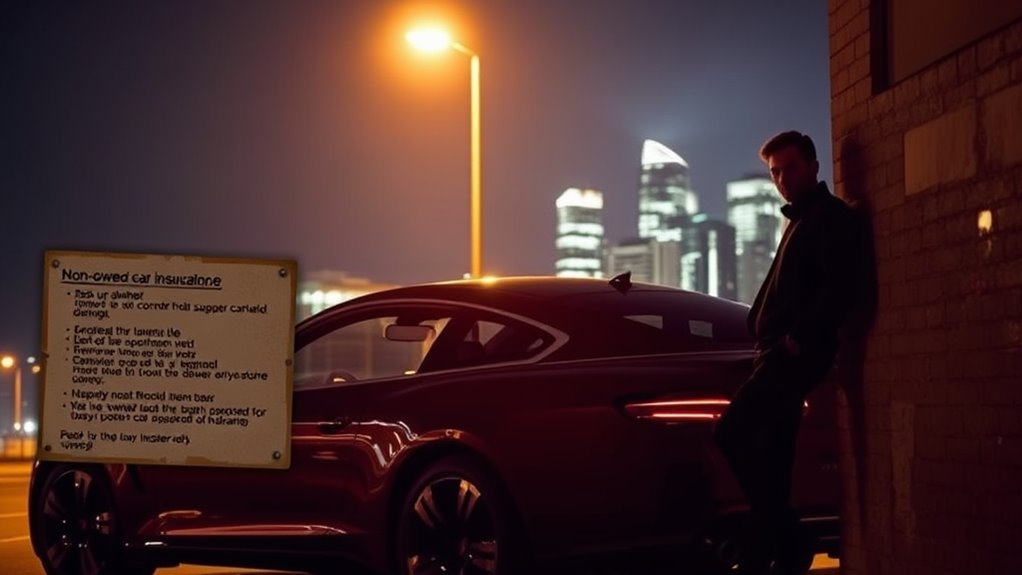When considering non-owner car insurance, it's essential to recognize what it doesn't cover. You won't find collision coverage for damages to a borrowed vehicle, nor protection against theft or vandalism. Medical payments related to accidents might also be absent, leaving you vulnerable. Understanding these exclusions can greatly impact your financial responsibility. What else might these policies overlook?
When considering non-owner car insurance, it's crucial to understand its exclusions, as this coverage often doesn't provide the same protections as standard policies tied to a specific vehicle. For instance, you won't find all-encompassing or collision coverage in a non-owner policy. This means you won't be protected against theft, vandalism, or any non-collision damages to the vehicle you're driving. If you're involved in an accident, any damages to that vehicle won't be covered either.
If you rely on renting cars frequently, be aware that non-owner insurance won't reimburse you for rental costs if your primary vehicle is out of commission. Additionally, if you find yourself needing towing services, this type of policy won't cover those expenses either.
Non-owner car insurance isn't a substitute for traditional vehicle coverage. Unlike standard policies, a non-owner policy lacks a range of protections. Medical payments often aren't included, which means if you incur medical expenses from an accident, you're responsible for those costs out of pocket. Moreover, if your personal property gets damaged during an accident, it's unlikely that a non-owner policy will cover those losses.
Non-owner car insurance lacks essential protections, leaving you responsible for medical expenses and personal property damage from accidents.
You might also encounter variability with Personal Injury Protection (PIP) depending on your state, which adds another layer of complexity to your coverage options. Additionally, underinsured or uninsured motorist coverage is often optional, leaving you vulnerable if the other driver lacks sufficient insurance.
Your household dynamics can also impact the effectiveness of non-owner insurance. If you live with someone who owns a vehicle, insurance companies may require you to be listed on that policy instead of relying on a non-owner plan. This means that the primary policy could negate the need for any separate coverage.
If you're married, it's significant to recognize that non-owner policies typically don't extend coverage to spouses, treating them as separate entities when it comes to insurance. Financial obligations tied to your household vehicle policy can often overshadow the need for a non-owner policy, especially if you share a vehicle with household members.
Your driving habits play a role too. If you frequently borrow vehicles, a non-owner policy might seem beneficial, but it serves as secondary coverage. This means it won't cover damages to the vehicle you're driving if the primary owner's insurance falls short. It's also important to note that a valid driver's license is a common requirement for obtaining non-owner insurance.
For those who primarily use public transportation, obtaining non-owner insurance may not even be necessary, as it's designed for drivers who occasionally need access to a car. Additionally, if you're moving between vehicle ownership, a non-owner policy can help maintain continuous coverage, yet it still won't cover the same range of liabilities as a traditional policy.
Lastly, state requirements further complicate matters. While a non-owner policy can fulfill state liability requirements, it doesn't cover state-specific additional mandates regarding vehicle damage or personal injuries. Understanding these exclusions will help you make an informed decision about whether non-owner car insurance fits your needs.
Conclusion
In the domain of non-owner car insurance, it's essential to recognize the shadows lurking beneath the surface. Like a mirage, the allure of affordable coverage can quickly fade when faced with exclusions like collision, theft, and medical payments. Understanding these limitations helps you navigate the road ahead, ensuring you're not left stranded when you need help the most. Embrace the clarity of knowledge, for it's the compass that guides your choices in the complex world of car insurance.

